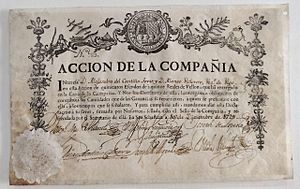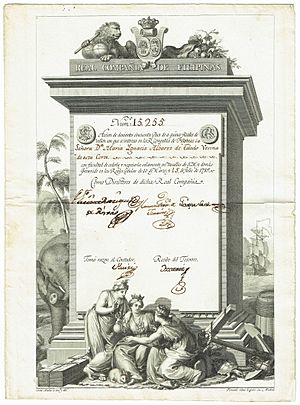Guipuzcoan Company of Caracas facts for kids
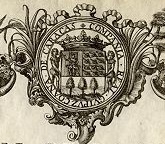 |
|
| Public company | |
| Industry | Trade |
| Fate | Dissolved |
| Successor | Royal Company of the Philippines |
| Founded | 1728 |
| Defunct | 1785 |
| Headquarters | , |
|
Area served
|
Venezuela Province |
The Royal Guipuzcoan Company of Caracas (also known as the Guipuzcoana Company) was a Spanish trading company from the 1700s. It operated from 1728 to 1785 and had a special right to control all trade in Venezuela. In 1785, its name was changed to the Royal Philippine Company.
Contents
History of the Guipuzcoan Company
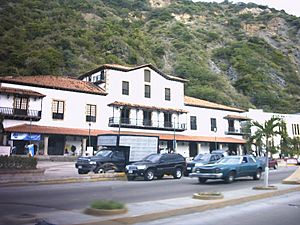
How the Company Started
A group of rich business people from the Gipuzkoa region in Spain founded the company in 1728. Their main goal was to stop the Dutch from controlling the cocoa trade in Venezuela. The Dutch had a very strong hold on this trade.
The company first set up its main office in San Sebastián. King Philip V of Spain officially approved its creation on September 25, 1728. This was part of bigger changes by the Spanish royal family to stop illegal trading. Much of this illegal trade, especially in tobacco, happened along the Orinoco River. Foreign traders from the Netherlands, England, and France often benefited most from it.
Venezuelan landowners preferred trading with these foreign groups. This meant the Spanish Crown wasn't making much money from its Venezuelan colonies. Between 1700 and 1728, only five ships sailed from Spain to Venezuela. The company's creation aimed to fix this problem.
The idea for the company came after talks between the Spanish king and the Basque governments. The government of Gipuzkoa suggested a plan to restart trade with Venezuela. This plan would help both the Basque region and the Spanish king. The plan was approved, giving the Basques full control over this trade.
The Guipuzcoana Company was the only group allowed to sell European goods in Venezuela. It was also the only one allowed to send Venezuelan farm products back to Spain. Goods imported into other Spanish areas would not have extra taxes if they crossed the Ebro river. This was agreed upon with King Philip V. The company could also trade freely across Europe. It was the first company in Spain to sell shares to investors. Both Basque shareholders and the king of Spain owned parts of it.
After 1743, the company got permission to use French ships. These ships could trade directly with Venezuela. This decision mainly helped the French Basque coast, especially the city of Bayonne.
Company Activities in Venezuela
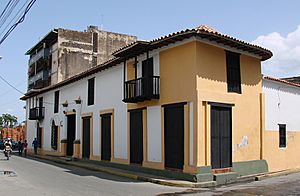
The company started its operations in 1730. Four ships sailed from San Sebastián with 561 crew members and 40-50 cannons. When they arrived, the Venezuelan locals were very unhappy. They refused to sell cocoa to the company. There was even an uprising against the new arrivals and the local Spanish soldiers, until the situation was brought under control.
Basque people began to settle in Venezuela. They bought large farms called haciendas and helped grow more crops. However, other local landowners, called Creoles, did not like this. They felt it made the prices of their goods go down when selling to the company. The Basques built new settlements, docks, and forts. The term un gran cacao (a big cocoa) became a nickname for a powerful person in Venezuela. This term is still used today for important people.
The company was very important for growing large amounts of cocoa along the coast. It also encouraged the production of other crops like tobacco, indigo, cotton, and coffee. The company also helped explore and settle new areas. A famous expedition from 1750 to 1761, led by company agent José de Iturriaga y Aguirre, created new settlements in the Guayana region.
The company controlled the main ports of La Guaira and Puerto Cabello. This meant it controlled almost all legal trade for other Venezuelan areas. The company also strictly controlled many imported goods that people needed. This caused a lot of anger among the locals. Several rebellions happened against the company and the Basques. In 1749, there was a big conflict between the local Creoles (supported by the Dutch and English) and the powerful Basques (supported by the Spanish King). Juan Francisco de León led this rebellion. But the Spanish King protected the company and stopped the uprising that same year.
Impact on Gipuzkoa
The company helped break the Dutch trade control and brought a lot of wealth to Basque port cities. It also created many job opportunities for Basque people. The company's work kept Basque iron factories busy, even though they faced tough competition from English industries. It also indirectly supported arms factories in Soraluze and Tolosa.
Another important result was the founding of the Royal Basque Society of Friends of the Country in Bergara in 1765. This group, led by Xavier María de Munibe e Idiáquez, Count of Peñaflorida, was a type of Enlightenment "think tank." Its ideas spread throughout Spain, leading to the creation of similar groups.
Later Years of the Company
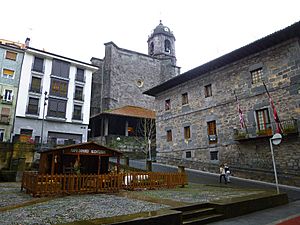
After 1749, the Spanish King made changes that weakened the Basque control over the company. The company's main office was moved to Madrid, which Gipuzkoa did not like. Also, a Spaniard had to be on the board of directors (1751). The company faced more attacks from English warships. It also became weaker when trade with Venezuela was opened up to more companies in 1776.
The company's special right to control trade ended. The King no longer felt a single company was needed to control and grow the economy. By then, Venezuela's economy was strong and closely connected to markets in Spain and New Spain. These places bought most of Venezuela's cocoa. The Spanish King ended the company's special agreement in 1784.
Even though the Caracas Company eventually failed as a business, it made sure Caracas remained an important city. When the King set up a high court in Venezuela in 1786, it was placed in Caracas.
The owners of the Guipuzcoana Company changed it into the Royal Philippine Company in 1785. In Caracas, a group of merchants called a consulado de mercaderes took over from the company in 1793. François Cabarrus, a major company shareholder from Bayonne, was a strong supporter of this change.
See also
 In Spanish: Compañía Guipuzcoana para niños
In Spanish: Compañía Guipuzcoana para niños 
 | Charles R. Drew |
 | Benjamin Banneker |
 | Jane C. Wright |
 | Roger Arliner Young |


